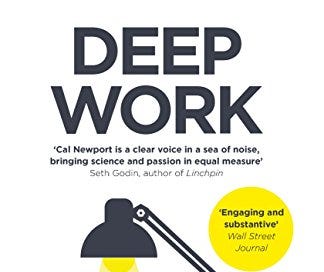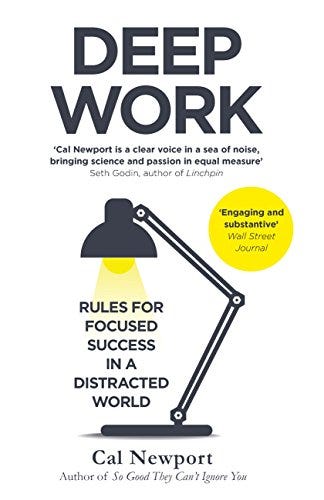In the fast-paced world we live in today, productivity and focus are often elusive. With the constant barrage of distractions, it can be challenging to accomplish meaningful work. But in this review for Cal Newport's book "Deep Work," we may find a guide to understanding and achieving true productivity through the concept of deep work. In this review, we will delve into the key ideas presented in the book, exploring strategies to overcome distractions, methods for scheduling work and leisure, and techniques to rewire our brains for enhanced focus.
Multitasking and Distraction are Productivity's Enemies
Many people mistakenly believe that juggling multiple tasks at once is the most efficient way to use their time. However, this belief is fundamentally flawed because multitasking doesn't equate to productivity.
Sophie Leroy, a business professor at the University of Minnesota, conducted research in 2009 to shed light on this phenomenon. Her studies revealed that when we switch from one task (Task A) to another (Task B), our attention remains partially fixated on the first task. This partial focus on Task A diminishes our ability to fully concentrate on Task B, thereby hampering our performance.
The negative impact of multitasking isn't limited to physical tasks but also extends to the digital realm. For example, keeping social media and email tabs open in your web browser may seem harmless. However, the mere presence of notifications can disrupt your focus, even if you don't immediately address them.
Paradoxically, despite spending considerable time on various small tasks and managing information, many workers feel busier than ever. Completing these small tasks can create a false sense of busyness and accomplishment, but in reality, it hinders deep focus.
Strategies for Achieving Deep Work
To achieve deep work, you must be intentional about your approach. While there is no one-size-fits-all strategy, several methods can help you overcome distractions and cultivate deep focus.
The Monastic Approach: This approach involves eliminating all sources of distraction and secluding yourself, much like a monk in a monastery. By creating an environment free from interruptions, you can dedicate your full attention to your work.
The Bimodal Approach: In the bimodal approach, you set aside clearly defined, extended periods for deep work. During these focused sessions, you immerse yourself entirely in your work. The rest of your time remains free for other tasks and activities.
The Rhythmic Approach: This method involves forming a habit of engaging in deep work for specific blocks of time, such as 90 minutes. You use a calendar to track your deep work accomplishments, ensuring a regular practice.
The Journalistic Strategy: With this strategy, you capitalize on unexpected pockets of free time in your daily routine to engage in deep work. Regardless of the approach you choose, the key is that these methods are systematic and intentional.
Rituals are essential to prepare your mind for deep work. These rituals may include defining your workspace, such as using a "do not disturb" sign or working in a library or coffee shop. For example, J.K. Rowling famously stayed at a five-star hotel to escape distractions while finishing her Harry Potter series. Another critical ritual is defining boundaries. Disconnecting from the internet or turning off your phone during deep work sessions helps eliminate digital distractions.
Make your deep work sustainable by attending to your physical needs. Whether it's incorporating light exercise, maintaining proper nutrition, or having a caffeine boost, taking care of your body ensures you have the mental energy required for deep work.
Focus Your Brain and Be Selective About Technology
In today's world, distractions are everywhere, with people glued to screens, constantly engaging with games, messaging, or social media. Our brains are naturally wired to be easily distracted. This trait has evolutionary roots as distractions could represent both risks and opportunities.
To rewire your brain and enhance focus, Newport suggests a concept called "productive meditation". This involves utilizing moments that would otherwise be unproductive, such as walking your dog, taking a shower, or commuting, to ponder a specific problem without allowing your mind to wander. During productive meditation, ask yourself questions that help identify and solve the problem at hand. This process is akin to a workout routine for your brain, strengthening your ability to maintain focus.
Be conscious of your intentions when using technology, especially social media. If you use platforms like Facebook to stay in touch with friends, use them for that purpose. Try to balance online interaction with in-person connections. If you find that social media is consuming too much of your time and attention, consider a 30-day detox. Afterward, assess whether your life improved without it. If the answer is no, you might consider quitting social media for good.
Scheduling for Restoration of Energy
After a long day at work or running errands, many people find themselves wanting to relax with no specific tasks in mind. However, this often leads to unproductive routines like watching TV, scrolling through phones, or mindlessly staring at computers, ultimately leaving you more tired than when you started.
The Solution --> Scheduled Time Blocks
To avoid this energy-draining cycle, Newport suggests the importance of scheduling your activities. At the beginning of each workday, create a schedule divided into blocks, with each block lasting at least 30 minutes. This schedule should encompass both work-related tasks and personal activities, including time for relaxation, meals, and checking email.
It's understood that your schedule may need adjustments throughout the day due to unforeseen circumstances. The goal isn't rigid adherence to the schedule but rather cultivating awareness of how you spend your time. If changes are necessary, simply rearrange your time blocks accordingly. Extending this scheduling approach to your evenings and weekends is also crucial. Planning ahead for personal time can help you focus on specific goals and prevent work-related tasks from encroaching on your personal life. For example, set limits and avoid checking email after a certain time to allow your mind to disengage from work.
It's important to plan evenings and weekends around activities that don't involve the internet. This can be an opportunity to revitalize your mind and body through activities like reading, exercise, or spending quality time with loved ones.
"Deep Work" Review Vote
To sum it up, "Deep Work" by Cal Newport gives us some great ideas to make our work and life better. We've seen that trying to do too many things at once doesn't work well. Instead, we should focus deeply on one thing at a time.
We also learned about different ways to plan our time, like making schedules. This helps us balance work and fun, so we don't feel tired all the time. And we saw that it's good to take breaks from the internet and do things like reading or spending time with family and friends.
So, remember, deep work can make our days more productive and enjoyable. It's like a magic trick that helps us do better at what we care about.
If you want to buy the book on Amazon and support the blog, use the link below.




